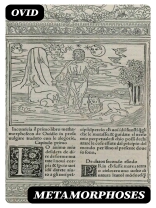Ovid’s ‘Metamorphoses’ is a masterful narrative poem that weaves together over 250 myths, exploring the transient nature of existence through the lens of transformation. Written in elegant hexameters, this seminal work engages the reader with its rich tapestry of characters ranging from gods and heroes to ordinary mortals. Ovid employs a dynamic storytelling style that blends humor, pathos, and philosophical inquiry, serving as both a literary epic and a profound commentary on change and identity. The poem is notable for its innovative structure, where stories are interconnected, reflecting the fluidity of time and human experience, set against the backdrop of Greco-Roman mythology. Ovid, born in 43 BCE in Sulmo, was a prominent figure in the Golden Age of Latin literature. His background in rhetoric and law, coupled with his exposure to the rich traditions of mythology, profoundly influenced his literary pursuits. ‘Metamorphoses, ‘ completed around 8 CE, reflects Ovid’s exploration of themes such as love, loss, and transformation, as well as a subtle critique of the moral constraints of his time. This transformative work came during his exile, reflecting a personal journey parallel to the mythological transformations he recounts. This timeless classic is highly recommended for readers interested in the intersections of mythology, literature, and human experience. ‘Metamorphoses’ not only enriches our understanding of classical tales but also invites contemporary readers to reflect on their own transformations and the nature of change itself, making it an essential read for both scholars and enthusiasts of the literary arts.
Giới thiệu về tác giả
Publius Ovidius Naso, known to the English-speaking world as Ovid, was a prolific Roman poet whose literary works have left a permanent imprint on Western literature and art. Born on March 20, 43 BCE, in Sulmo, in what is now central Italy, Ovid enjoyed the benefits of a privileged upbringing and a comprehensive education that prepared him for a public career. However, his passion for poetry could not be sidelined, and he chose to pursue writing instead. Ovid’s early works included the ‘Amores’, a collection of love elegies, and the ‘Ars Amatoria’, which is a didactic elegy on love. His magnum opus, ‘Metamorphoses’, is a narrative epic consisting of over 250 myths, organized into fifteen books. This work has proved foundational for the subsequent Western literary and artistic traditions, retelling stories of transformation rooted in Greco-Roman myth and legend. ‘Metamorphoses’ alone would cement Ovid’s reputation, but his other works also demonstrate his skillful use of meter, imaginative storytelling, and psychological insight. His literary style is characterized by its rhetorical brilliance, wit, and often a subtle critique of Roman society and politics. Ovid’s later years were marred by his sudden exile to Tomis by the Emperor Augustus in 8 CE for reasons not entirely transparent, which he laments in his works ‘Tristia’ and ‘Epistulae ex Ponto’. Despite this, his influence has endured, with ‘Metamorphoses’ remaining a seminal text that continues to inspire writers, artists, and scholars to this day.












